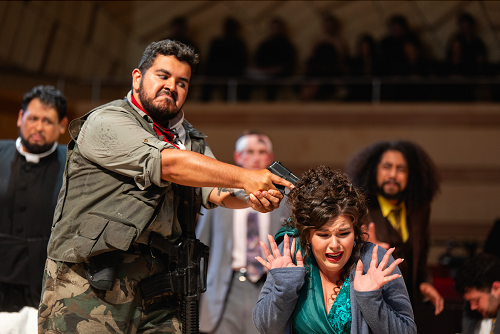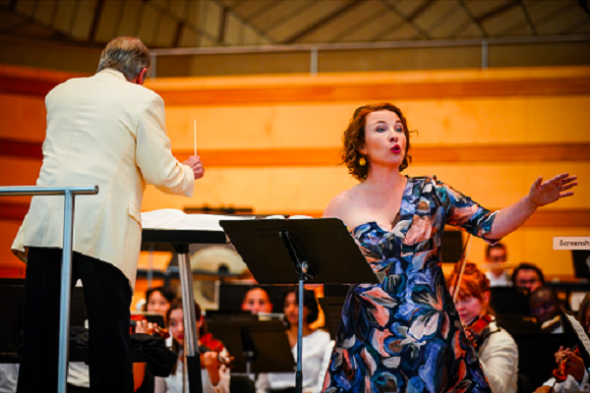 United States Aspen Music Festival 2023 [6]: Benedict Music Tent, Harris Hall, Aspen, Colorado. [HS]
United States Aspen Music Festival 2023 [6]: Benedict Music Tent, Harris Hall, Aspen, Colorado. [HS]

Judging by what we have seen and heard halfway through this year’s Aspen Music Festival, the programming, level of performances and balance of familiar and unfamiliar music are on track to be the richest we’ve experienced here.
Changes in the opera and voice program, rebranded as Aspen Opera Theater and VocalARTS with the arrival in 2019 of soprano Renée Fleming and conductor Patrick Summers as co-artistic directors, have much to do with that assessment. Talent level is up significantly among the four dozen singers and pianists on the cusp of opera careers, and they seem to have been integrated more generally than before into the festival’s programming.
Voices played a role in all three major performances this past weekend, including majestic singing from mezzo-soprano Sasha Cooke in Mahler’s Das Lied von der Erde (conducted by James Conlon in a return after several years’ absence from Aspen), two impressive ‘student’ voices in a ravishing new work on Saturday afternoon, and an exciting, semi-staged presentation of Bel Canto, Jimmy López Bellido’s big-boned opera based on the best-selling book by Ann Patchett.
Fleming championed the opera in her role as advisor to Lyric Opera of Chicago, and spearheaded efforts for Aspen to mount it for the first time since its debut in 2015. With so many well-trained singers on hand, casting the many solo roles in Bel Canto is more feasible than for some professional opera companies. George Manahan, who is no stranger to opera here, conducted the Chamber Symphony (expanded with extra brass and woodwinds) to fill the music tent with the score’s expansive sound. There is no way all this would fit into the tiny Wheeler Opera House. It all came to fruition with a bang on Friday in a performance with many positive aspects.
The story centers on a notorious 1996 incident in Lima, in which self-styled revolutionaries invaded a party in the Japanese embassy demanding justice for the poor, and held dozens of dignitaries hostage for 126 days before Peruvian forces intervened. Patchett’s novel tweaked the location to the vice president’s home, and introduced a visiting Japanese dignitary whose favorite opera singer is there to sing a song to him.
In Patchett’s story and Nilo Cruz’s libretto, the thrown-together characters find a way to co-exist as they discover their adversaries are actually human. Friendships, even love, blossom. The fictional story is more heart-warming than the reality in 1996.
Act II pays off with the obvious operatic potential of a diva and a range of characters thrown together from various levels of society. After several weeks in the same space, there are love duets and a revealing series of solo arias that highlight individual personalities. López’s music differentiated a wide array of characters, aided by director Kevin Newbury who shaped the original production in Chicago.
A Russian diplomat awkwardly declares his love for the opera singer. One of the terrorists, Carmen, delivers a lovely prayer, and another, César, sings a touching soliloquy that realizes this situation can only end badly. One tangy sequence details simultaneous liaisons between the opera singer and the Japanese dignitary and between his translator and the revolutionary soldier who sang the prayer. Things eventually come to a violent end for the terrorists and one hostage.
López’s first act bombards the audience with the powerful brass- and woodwind-heavy orchestra in music that seemed designed to make us feel like hostages. It worked, but the dense orchestration overbalanced the voices in conversational scenes, duets and arias. Without supertitles, all the Spanish, Japanese, Russian, German, French, Latin, Italian and Quechua sung (and occasionally spoken) by the characters would have been lost, but at least we should have heard their voices singing. Would the same orchestra have balanced better in an opera pit instead of onstage with the singers? Maybe, but someone dropped the ball getting things to work here in Aspen.
In the second half, we could appreciate the rich soprano of Kathryn Henry, the resonant bass-baritone of Yue Wu, the commanding bass-baritone of Joseph Park and the liquid elegance of countertenor Chuanyuan Liu. Other standouts included tenor César Andrés Parreño, mezzo-soprano Ruby Dibble and baritone José Luis Maldonado as Father Arguedas, the jolly and often wise cleric.

Sunday’s concert in the tent included a lively, full-speed-ahead Mendelssohn Piano Concerto No.2 played by Lise de la Salle. Conlon kept the orchestra jumping, and nicely balanced with the pianist’s charming playing, in the composer’s lesser-performed concerto.
That was a warmup for Mahler’s massive song cycle, which Conlon reminded the audience he had conducted for the first time in his career 40 summers ago in Aspen. His experience and musicality yielded a superb pace and expressive phrasing from the orchestra. If its enthusiasm sometimes covered tenor Rodrick Dixon, who is not quite the heldentenor we usually hear in these songs, the three works by mezzo-soprano Sasha Cooke were absolute jewels, especially the long, languid ‘Abschied’ that finished the work on a note of breathtaking poignancy.
Saturday afternoon, the Aspen Contemporary Ensemble delivered its most rewarding performance so far, first with Sarah Kirkland Snider’s ‘If you bring forth what is within you’, an orchestral suite of songs she wrote for The Blue Hour, a collaboration of five women composers. The program concluded with A Forest Unfolding, a paean to forests and how they connect with each other and with us, written by David Kirkland Garner, Stephen Jaffe, Eric Moe and Melinda Wagner.
In its 30 minutes, Forest included three songs sung effortlessly by soprano Grace Lerew and baritone Dante Mireles, and four spoken sections quoting Thoreau to the Book of Job, voiced articulately by Fleming and novelist Richard Powers, underscored by the instrumental ensemble. The final section, from Powers’ Overstory, finished with a sublime, ethereal musical summation penned by Garner.
Finally, on Saturday night, bassists Edgar Meyer and Christian McBride completed a virtuoso trifecta for Aspen. Within one week, we had incandescent performances from artists who are top-of-the-list in their fields – soprano Renée Fleming in recital with pianist Inon Barnatan, and violinist Augustin Hadelich unaccompanied. Saturday’s concert brought together classical music’s leading bass player with jazz’s ace for 90 minutes of delicious collaboration.
Both musicians are more than bass players, of course. They are also composers, and their practiced improvisations reflect that sense of form and musical storytelling. Meyer’s roots in bluegrass made a smile-worthy match with McBride’s rhythmic foundation, so reminiscent of the jazz great Ray Brown, in Meyer tunes such ‘Green Slime’, ‘FRB’, and ‘Thanks’ (the latter written for longtime Aspenite Marty Flug’s memorial). McBride’s jazz chops settling into Bill Monroe’s ‘Tennessee Blues’ with Meyer was especially noteworthy.
Their ventures into jazz standards produced some of the best moments. Meyer on piano accompanied McBride in a slyly slow ‘Bewitched, Bothered and Bewildered’, and both basses had a breathless race in ‘Solar,’ made famous by Miles Davis. The stunning encore, a cool and slinky version of Davis’s ‘All Blues’, put a sensational cap on the evening. They both can range high up the fingerboard to play in treble-clef range with ease. Where Meyer tended to bow his improvised solos, McBride played his pizzicato with jaw-dropping rapidity. If McBride’s bass lines tended toward the muscular, Meyer’s aimed for fluidity. It never got dull. Just bass heaven.
McBride also let slip that he and Meyer have recorded tracks for an upcoming album that will include some of the pieces they played Saturday.
Harvey Steiman
21.7.2023: Jimmy López Bellido, Bel Canto: Soloists and chorus of Aspen Opera Theater and VocalARTS / Patrick Summer (chorus master), Aspen Chamber Orchestra / George Manahan (conductor). Benedict Music Tent
Production:
Libretto – Nilo Cruz
Director – Kevin Newbury
Fight choreographer – William LeDent
Costumes – Brynne Oster-Bainsson
Lighting – Josh Hermano
Wigs & makeup – Nicole Alvarez
Cast:
Roxane Rosa – Katherine Henry
Katsumi Hosakawa – Yue Wu
General Alfredo – Angel M. Vargas
General Benjamin – Joseph Park
Gen Watanabe – Cesar Andrés Parreño
Carmen – Ruby Dibble
Christopf – Nathan Bryon
Rubén Iglesias – Matthew Goodheart
Father Arguedas – Jose Luis Maldonado
César – Chuanyuan Liu
22.7.2023: Chamber Music: Soloists, Aspen Contemporary Ensemble / Timothy Weiss (conductor). Harris Hall
Sarah Kirkland Snider – ‘If you bring forth what is within you’ (suite from Blue Hour)
Garner, Jaffe, Moe, Wagner – A Forest Unfolding, Grace Lerew (soprano), Dante Mireles (baritone), Renée Fleming and Richard Powers (narrators)
22.7.2023: Edgar Meyer and Christian McBride (double basses). Harris Hall
Meyer – ‘Green Slime,’ ‘FRB’, ‘Duo #1’, ‘Thanks’, ‘Barnyard Disturbance’
Rodgers – ‘My Funny Valentine’, ‘Bewitched, Bothered and Bewildered’
Wayne (attributed) – ‘Solar’
McBride – ‘Lullaby for a Ladybug’
Monroe – ‘Tennessee Blues’
Howard – ‘Fly me to the Moon’
23.7.2023: Lise de la Salle (piano), Sasha Cooke (mezzo-soprano), Rodrick Dixon (tenor), Aspen Festival Orchestra / James Conlon (conductor). Benedict Music Tent
Mendelssohn – Piano Concerto No.2 in D minor
Mahler – Das Lied von der Erde
